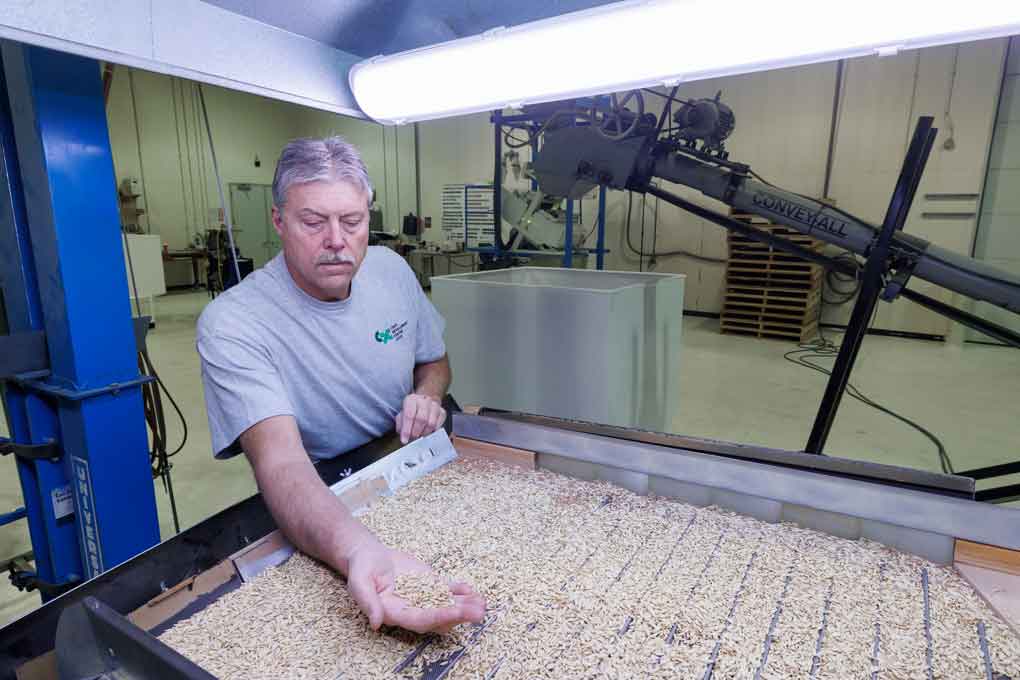Saskatoon, Saskatchewan, Canada
October 28, 2024
David Benallack takes CDC Research from Farm to Table

Dave Benallack examines seed size on a gravity table. (photo by Dave Stobbe)
Amidst the thousands of genetic crosses attempted on pulse and cereal seed at the University of Saskatchewan (USask) Crop Development Centre (CDC), only a handful will eventually become varieties. However, once varieties are developed and commercialized, much more work is required to produce “certified seed” including maintaining their pedigree and putting them through the seed certification process. So why do researchers at the CDC entertain such a lengthy and laborious process? Dave Benallack, head of the Breeder Seed Production Unit at Kernen Crop Research Farm says, ‘developing new varieties often involves extensive testing to identify traits that improve performance or other desirable characteristics. This process can take time but is crucial for ensuring improvements are happening’
Benallack knows a thing or two about how seeds make their way from the annals of research to market where they are sold as certified seed to growers across the country. During his 36 years at the CDC, Benallack has overseen the development of breeder seed–the purest form of a variety–for over 600 different crop varieties, many of which have been instrumental in both the economy of the province and the growing nutritional demands of the world. Western Canadian growers are leaders in the development of improved, sustainable agricultural practices that deliver more and better quality products to the world’s growing population. Often, the seeds of that success are sown, literally, at the Kernen Crop Research Farm just East of Saskatoon. “Growers want to know that the seed they are purchasing are true to the variety and that they will yield better, be more disease tolerant, or be responsive to the demands of growing conditions,” says Benallack. “The work we do to develop breeder seed at Kernen lays the groundwork for that guarantee.”
Benallack’s operations at the Kernen Crop Research Farm are something of a middleman between the laborious breeding activities performed at the CDC and the development of ‘certified seed’ for commercial sale. Before coming to coming to the breeder seed facility at the Kernen Crop Research Farm, plant breeders at USask begin by making individual genetic crosses on seeds in search of desirable traits including improved yield, disease tolerance, and nutritional content. “At this point,” Benallack says, “there is a lot of experimentation. You have to try a lot of things before you find one that works. Only the best-performing seeds make it past this step. If a variety looks promising, plant breeders will test the varieties in official registration trials and only the best will be released. It is at that point the varieties are passed along to us at Kernen.” Once a variety is in his care, Benallack’s job is to increase the ‘breeder seed’ to an amount that is viable for tender for seed companies who might be interested in commercializing the variety. If purchased, the seed begins the four-year process of becoming certified. During this time, under the nurturance of seed growers, the seed is grown, increased, and the pedigree is monitored closely by external agencies to ensure its purity, isolation, and freedom from contaminants. Each variety is grown and increased for four years. In its first growing season, the seed is known as ‘Select’ seed, in its second ‘Foundation’ seed, in its third ‘Registered’ seed, and, if it performs well and maintains its pedigree, it becomes ‘Certified’ in its fourth year. It is the Certified seed that is sold to farmers for use on their farms.
Buyers of agricultural products also rely on the guarantees of the seed certification process. Brewers, for example, use ingredients grown from certified seed to ensure the quality and consistency of their brew. Certified seed of CDC PlatinumStar® and CDC Goldstar®, LOXless malting varieties of barley, are required to make Sapporo and PML. More locally, Regina’s Rebellion Brewing Co. uses USask’s CDC King Red-1® (CDC KR-1) Lentil in their hallmark beverage, their Lentil Cream Ale. ‘Common seed,’ grown year upon year without monitoring its pedigree and purity, is subject to contamination and could not make the same promises to buyers like these.
Benallack, who has close ties to both the research and commercial ends of the seed certification process, says “The process of seed certification protects the research all the way from the research lab to the farmer's field. It ensures that the promises of the breeders at the CDC make their way into grain bins and onto tables across the country.”